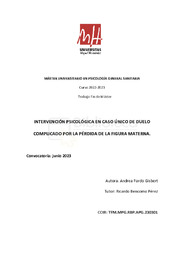Por favor, use este identificador para citar o enlazar este ítem:
https://hdl.handle.net/11000/31926Registro completo de metadatos
| Campo DC | Valor | Lengua/Idioma |
|---|---|---|
| dc.contributor.advisor | Bencomo Perez, Ricardo | - |
| dc.contributor.author | Pardo Gisbert, Andrea | - |
| dc.contributor.other | Departamentos de la UMH::Psicología de la Salud | es_ES |
| dc.date.accessioned | 2024-04-17T10:04:54Z | - |
| dc.date.available | 2024-04-17T10:04:54Z | - |
| dc.date.created | 2023-06 | - |
| dc.identifier.uri | https://hdl.handle.net/11000/31926 | - |
| dc.description.abstract | El duelo es una reacción natural y adaptativa ante una experiencia de pérdida o muerte. Debido a la gran cantidad de factores implicados en dicho proceso, el duelo puede desarrollarse de manera desadaptativa y generar un Trastorno de Duelo Complejo y Persistente. El objetivo del estudio fue evaluar e intervenir con terapia cognitivo-conductual un caso único de una paciente de 21 años con Trastorno de Duelo Complejo y Persistente, tras la pérdida de la figura materna por enfermedad de cáncer y en época de COVID-19, con el fin de reducir síntomas ansiosos-depresivos, aumentar las horas de sueño y mejorar el afrontamiento emocional. El tratamiento psicológico contó con 16 sesiones donde se aplicó diferentes escalas y entrevistas estandarizadas pre y post tratamiento. Los resultados indicaron un mayor afrontamiento y reducción de síntomas ansioso-depresivo, así como una mayor sensación de apoyo social e incremento en horas en las horas de sueño y descanso. Tras la intervención, se reafirman otros estudios e investigaciones previas, donde señalan la importancia de la intervención psicológica en el reajuste y adaptación de las personas en el momento de duelo. | es_ES |
| dc.description.abstract | Grief is a natural and adaptive reaction to an experience of loss or death. Due to the large number of factors involved in this process, grief can develop in a maladaptive way and generate a Complex and Persistent Grief Disorder. The objective of the study was to evaluate and intervene with cognitive-behavioral therapy in a single case of a 21-year-old patient with Complex and Persistent Grief Disorder after the loss of the maternal figure in the time of COVID-19, in order to reduce anxious symptoms. -depressives, increase sleep hours and improve emotional coping. The psychological treatment had 16 sessions where different scales and pre- and post-treatment standardized interviews were applied. The results indicated a greater coping and reduction of anxious-depressive symptoms, as well as a greater feeling of social support and an increase in hours of sleep and rest. After the intervention, other previous studies and investigations are reaffirmed, where they point out the importance of psychological intervention in the readjustment and adaptation of people at the time of mourning. | es_ES |
| dc.format | application/pdf | es_ES |
| dc.format.extent | 34 | es_ES |
| dc.language.iso | spa | es_ES |
| dc.publisher | Universidad Miguel Hernández de Elche | es_ES |
| dc.rights | info:eu-repo/semantics/openAccess | es_ES |
| dc.rights | Attribution-NonCommercial-NoDerivatives 4.0 Internacional | * |
| dc.rights.uri | http://creativecommons.org/licenses/by-nc-nd/4.0/ | * |
| dc.subject | duelo | es_ES |
| dc.subject | duelo complicado | es_ES |
| dc.subject | estudio caso único | es_ES |
| dc.subject | intervención cognitivo-conductual | es_ES |
| dc.subject | grief | es_ES |
| dc.subject | complicated grief | es_ES |
| dc.subject | single case study | es_ES |
| dc.subject | cognitive-behavioral intervention | es_ES |
| dc.subject.other | CDU::1 - Filosofía y psicología::159.9 - Psicología | es_ES |
| dc.title | Intervención psicológica en caso único de duelo complicado por la pérdida de la figura materna | es_ES |
| dc.type | info:eu-repo/semantics/masterThesis | es_ES |

Ver/Abrir:
PARDO Andrea TFM.pdf
655,05 kB
Adobe PDF
Compartir:
 La licencia se describe como: Atribución-NonComercial-NoDerivada 4.0 Internacional.
La licencia se describe como: Atribución-NonComercial-NoDerivada 4.0 Internacional.
.png)